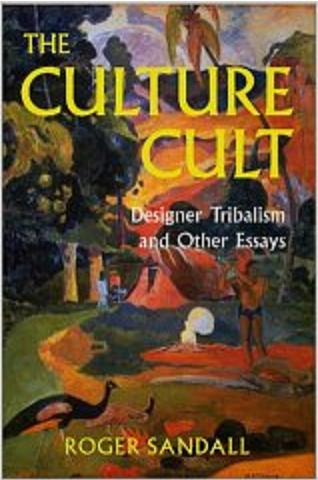The Culture Cult: Designer Tribalism and Other Essays
by Roger Sandall
Westview, Boulder, Colorado, 214 pp, $55

Roger Sandall's new book The Culture Cult has generally attracted attention because of the link made between his critique of Romantic Primitivism and the current situation regarding Aborigines in Australia. To concentrate on just this dimension of Sandall's analysis, however, does not do justice to the richness of Sandall's discussion of the nature of Romantic primitivism, and its implications for an understanding of the nature of contemporary civilisation.
At the heart of Sandall's discussion lies a contrast between those who favour a modern commercial order, with its qualities of openness and dynamism, and those who desire a return to some sort of "primitive", closed communal society. Sandall correctly traces the modern origins of this dichotomy to the Enlightenment. On the one hand, the Enlightenment saw the advocacy of "sweet commerce" by Montesquieu, Hume and Adam Smith; on the other hand, there was the desire to resist the embrace of commerce and return to a social order marked by solidarity and close social bonding, as seen in the work of Rousseau and the eighteenth-century German philosopher Johann Herder.
Sandall connects the cult of primitivism and the "noble savage" with those intellectuals and littérateurs who were disillusioned with the modern world and its commercial values. The bulk of the book consists of a number of case studies of people who contributed to what he terms the "culture cult": from Ruth Benedict and Margaret Mead to Karl Polanyi, Isaiah Berlin and Raymond Williams. What all of these intellectuals had in common was an opposition to modern commercial society and a concept of culture that exalted the primitive and/or closed social order. They are contrasted with others, including Popper, Hayek and Michael Polanyi who advocated the benefits of an open society. In particular, Sandall sees early twentieth-century Vienna as the primary battleground over which this intellectual conflict raged.
In many ways, however, Sandall leaves the crucial questions unanswered. Why are so many intellectuals attracted to visions of an ideal primitive past? Is it because, as Paul Johnson suggested in his Intellectuals, there are factors of individual psychological pathology at work? Or is that interpretation too limited? This is not a new phenomenon. In late fifth-century Athens, there was an idealisation of traditionalist "primitive" Sparta amongst the aristocratic intelligentsia led by Socrates, an idealisation that has lasted to our time, in the shape of Plato's Republic. Moving to the modern era, François Furet has described the bourgeois self-hatred that was a feature of Europe in the wake of the French Revolution.
In fact, a deeply ingrained prejudice against commerce, and in favour of "heroic", "aristocratic", or "cultured" values, has been part and parcel of most human societies. Paul Rahe has convincingly demonstrated that the ancient Greeks, including the Athenians, were motivated by military and political values and saw commerce as at best a means to a military end. Rome and China kept the men of commerce in their place. Even England did not so much exalt as tolerate commerce: the rule of law meant that the state could not plunder the profits of merchants. Burke believed that commerce should operate within the framework of established civilised, that is to say aristocratic, values. Until recently the élite in Australian society was turned away from studying commerce in favour of classics or law: business was something reserved for the less able.
This not to say that many of these societies did not possess qualities of "openness"; rather, it is to observe that the "open society" has always been a tender growth and in need of constant cultivation, because it has never been without its detractors and enemies. The roots of opposition to the "open society" run deep, and are in need of explanation. Marcel Gauchet has observed that, for 90 per cent of their history, human beings were locked into a communalism that enforced equality and discouraged initiative. Only with the development of agriculture did the possibility emerge of escaping this timeless communalism. Even then, most human beings during the agrarian age spent their time as downtrodden agricultural workers or slaves. Only in the last two centuries has the possibility emerged of a universal social and political order that delivers both freedom and dignity. Human beings are plastic creatures, capable of a whole range of cultural adaptations, but they are also prone to a whole range of anxieties and fears. Perhaps primitivism is a response to some of those anxieties.
It is also worth noting that the bold individualism of fifth-century Athens enjoyed general support, but that Spartan primitivism infected the pro-aristocratic intelligentsia in the wake of the failures of the Peloponnesian war. Could it also be that "Romantic primitivism" is especially attractive to those who feel left out in an open society, that is, aristocrats and those who believe themselves to be aristocrats of the spirit, in other words, the intelligentsia? Both the intelligentsia and the aristocracy are profoundly suspicious of ordinary people being free to make decisions, and often advocate means of restricting and regulating that activity.
Whatever may be the cause of the desire of many modern intellectuals and academics to revert to some sort of closed society, the agenda of "Romantic Primitivism" is one that needs to be both exposed and rejected. Sandall has done us all a great service by bringing together in these essays both a wide-ranging analysis of the phenomenon and a critique of its underlying ideas. He has also provided us with a warning about the fragility of the open society, at a time when its benefits are so manifest. Even if openness is a source of anxiety for some people, the alternative is so much worse; the communalism of 90 per cent of human history may seem attractive now, but at the time life really was "nasty, brutish and short".
No comments:
Post a Comment